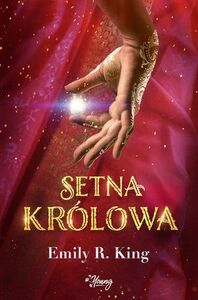Take a photo of a barcode or cover
I’m intrigued. Good but not amazing. I like Kali’s personality and relationships. The twists of her powers and background were excellent.
More reviews available at my blog, Beauty and the Bookworm.
The Hundredth Queen was one of the options for Kindle First a few months ago, a program where Amazon Prime members can get a free copy of a book each month. Fantasy books are pretty rare in the First selections, so I jumped at the chance to get this one. Plus, just look at that cover--so gorgeous. And the premise, about a young woman torn from her convent home in order to become the hundredth wife of the rajah of her country, and who hides a secret power, was just too good to pass up.
The thing is, the book doesn't really deliver on its premise. Our main character, Kalinda, doesn't learn about her abilities until relatively late in the book, though clearly the reader is clued in much earlier than that. Additionally, the idea that Kalinda is going to have to fight for her throne and her place among the rajah's other ninety-nine wives and his many courtesans isn't really played out in the way that seems promised, either. And finally, I wasn't convinced about the world building. We learn partway through the book that many of the things we think are true are not, and have actually only come to be the way they are in the past two decades because of actions of the rajah. I can totally buy Kalinda not knowing this--she was raised in a very secluded place, taught certain things by a select group of people who were forced into that way by benefactors who would have otherwise withdrawn their support. However. The entire country seems to have suddenly forgotten the way things used to be, and don't even whisper about it. The only group of people who seem to remember are blatant rebels. There are apparently only two camps here: totally fine with things or in outright rebellion, which seems quite unlikely to me.
But there were things I liked about this. I found the culture interesting; the religion is apparently loosely based on that of ancient Sumeria, and I found the concept of the wives, the rank tournaments, all of that so intriguing. A fantasy that's not based around a traditional medieval European setting, while becoming more common, is still very refreshing to me. Additionally, there (presumably) aren't any white characters in this! Yay for diversity! And finally, even though the premise of the book revolves around women fighting each other for their places at the whims of men, there are still strong female friendships here. Kalinda has a best friend present throughout the book, and even though a few rivals emerge once she's in the palace, other women present themselves as friendly and some who are are initially enemies ultimately come to her side. It was so nice to not see women constantly clawing each others' hair out over a guy...even if there was a snake in Kalinda's bed at one point. Ah, well, I guess you can't win them all.
Overall, I think this had an interesting premise, but King got too invested in a side romance than in what could have been Kalinda's growth and fight for her place in an unfamiliar world. The writing is okay, but there are gaps in the world that shouldn't have been there and overall this just wasn't as robust as it could have been. Not sure I'm intrigued enough to read the others in the series.
2 stars out of 5.
The Hundredth Queen was one of the options for Kindle First a few months ago, a program where Amazon Prime members can get a free copy of a book each month. Fantasy books are pretty rare in the First selections, so I jumped at the chance to get this one. Plus, just look at that cover--so gorgeous. And the premise, about a young woman torn from her convent home in order to become the hundredth wife of the rajah of her country, and who hides a secret power, was just too good to pass up.
The thing is, the book doesn't really deliver on its premise. Our main character, Kalinda, doesn't learn about her abilities until relatively late in the book, though clearly the reader is clued in much earlier than that. Additionally, the idea that Kalinda is going to have to fight for her throne and her place among the rajah's other ninety-nine wives and his many courtesans isn't really played out in the way that seems promised, either. And finally, I wasn't convinced about the world building. We learn partway through the book that many of the things we think are true are not, and have actually only come to be the way they are in the past two decades because of actions of the rajah. I can totally buy Kalinda not knowing this--she was raised in a very secluded place, taught certain things by a select group of people who were forced into that way by benefactors who would have otherwise withdrawn their support. However. The entire country seems to have suddenly forgotten the way things used to be, and don't even whisper about it. The only group of people who seem to remember are blatant rebels. There are apparently only two camps here: totally fine with things or in outright rebellion, which seems quite unlikely to me.
But there were things I liked about this. I found the culture interesting; the religion is apparently loosely based on that of ancient Sumeria, and I found the concept of the wives, the rank tournaments, all of that so intriguing. A fantasy that's not based around a traditional medieval European setting, while becoming more common, is still very refreshing to me. Additionally, there (presumably) aren't any white characters in this! Yay for diversity! And finally, even though the premise of the book revolves around women fighting each other for their places at the whims of men, there are still strong female friendships here. Kalinda has a best friend present throughout the book, and even though a few rivals emerge once she's in the palace, other women present themselves as friendly and some who are are initially enemies ultimately come to her side. It was so nice to not see women constantly clawing each others' hair out over a guy...even if there was a snake in Kalinda's bed at one point. Ah, well, I guess you can't win them all.
Overall, I think this had an interesting premise, but King got too invested in a side romance than in what could have been Kalinda's growth and fight for her place in an unfamiliar world. The writing is okay, but there are gaps in the world that shouldn't have been there and overall this just wasn't as robust as it could have been. Not sure I'm intrigued enough to read the others in the series.
2 stars out of 5.
„Die letzte Königin - Das schlafende Feuer“ ist der erste Teil einer neuen Reihe von Autorin Emily R. King. Die Geschichte ist im Präsens aus der Sicht von Hauptprotagonistin Kalinda geschrieben. Diesen Erzählstil mag ich leider nicht besonders, er hat meinen Lesefluss aber nicht stark beeinträchtigt.
Anhand des Klappentextes hatte ich eine richtig spannende Geschichte mit vielen Kämpfen erwartet. Teilweise ist das Buch auch actionreich, für meinen Geschmack ist da aber noch Luft nach oben. Ich würde den Roman eher in die Kategorie Jugendbuch einordnen. Der Schreibstil ist angenehm und das Buch recht einfach zu lesen. Ein paar Logikfehler sind mir aber leider negativ aufgefallen. Etwas vorhersehbar ist die Geschichte auch.
Trotz Kritik ist das Buch unterhaltsam, der Reihenauftakt ist durchaus gelungen. Kalinda ist eine starke Protagonistin, der männliche Hauptcharakter Deven Naik und auch viele Nebencharaktere bleiben aber leider etwas blass. Man erfährt viel zu wenig über ihre Vergangenheit. Dennoch hat diese Reihe großes Potenzial. Ich bin gespannt auf die Folgebände, die ich bestimmt lesen werde.
Mein Fazit:
Idee/Storyentwicklung: 3 von 5
Schreib- und Sprachstil: 4 von 5
Charaktere: 3 von 5
Unterhaltung: 4 von 5
Gesamt: 3,5 Sterne
Anhand des Klappentextes hatte ich eine richtig spannende Geschichte mit vielen Kämpfen erwartet. Teilweise ist das Buch auch actionreich, für meinen Geschmack ist da aber noch Luft nach oben. Ich würde den Roman eher in die Kategorie Jugendbuch einordnen. Der Schreibstil ist angenehm und das Buch recht einfach zu lesen. Ein paar Logikfehler sind mir aber leider negativ aufgefallen. Etwas vorhersehbar ist die Geschichte auch.
Trotz Kritik ist das Buch unterhaltsam, der Reihenauftakt ist durchaus gelungen. Kalinda ist eine starke Protagonistin, der männliche Hauptcharakter Deven Naik und auch viele Nebencharaktere bleiben aber leider etwas blass. Man erfährt viel zu wenig über ihre Vergangenheit. Dennoch hat diese Reihe großes Potenzial. Ich bin gespannt auf die Folgebände, die ich bestimmt lesen werde.
Mein Fazit:
Idee/Storyentwicklung: 3 von 5
Schreib- und Sprachstil: 4 von 5
Charaktere: 3 von 5
Unterhaltung: 4 von 5
Gesamt: 3,5 Sterne
This was just bad. A harem story that pretends to have a battle story and is mostly just stupid and predictable while it pretends to be deep and complicated.
Here is the whole review: https://www.youtube.com/watch?v=uhiGpMTiML8
Here is the whole review: https://www.youtube.com/watch?v=uhiGpMTiML8
Orphan Kalinda was left at a temple and has always been sickly with a fever, spending most of her childhood in the infirmary. She wants nothing more from her life than to stay at the Samiya Temple with her best friend Jaya, but it seems the gods have other plans for her.
Kalinda is chosen to be rajah Tarek’s one hundredth rani. She must leave Jaya, and her dreams behind and head to the Turquoise Palace in Vanhi. Her journey to Vanhi has its own trials, one of which is meeting a bhuta: a Burner which is a human who can control fire. The palace is filled with intrigues, and Kalinda must fight to the death the rajah’s courtesans and defend her place as the hundredth rani. In Vanhi Kalinda finds love, loss, and learns more about herself here than at Samiya Temple. King’s book has strong female characters who are brave and think for themselves. The women soon learn that together they are stronger, and have more fortitude than the men that possess them. It all takes place in a fantasy world inspired by Indian and Asian cultures. Kalinda hopes to use her newfound strength and position to set women, and people free from a cruel and selfish rajah.
This book could easily become a series, and if it does I will be excited to read more of this story.
Kalinda is chosen to be rajah Tarek’s one hundredth rani. She must leave Jaya, and her dreams behind and head to the Turquoise Palace in Vanhi. Her journey to Vanhi has its own trials, one of which is meeting a bhuta: a Burner which is a human who can control fire. The palace is filled with intrigues, and Kalinda must fight to the death the rajah’s courtesans and defend her place as the hundredth rani. In Vanhi Kalinda finds love, loss, and learns more about herself here than at Samiya Temple. King’s book has strong female characters who are brave and think for themselves. The women soon learn that together they are stronger, and have more fortitude than the men that possess them. It all takes place in a fantasy world inspired by Indian and Asian cultures. Kalinda hopes to use her newfound strength and position to set women, and people free from a cruel and selfish rajah.
This book could easily become a series, and if it does I will be excited to read more of this story.
I liked it, but indifferent about continuing the series.
Admittedly I enjoyed reading this book, but after some research I recognize that it is problematic. I will work on educating myself before reading books going forward!
https://twitter.com/thedimishra/status/852664798235860992
https://twitter.com/thedimishra/status/852664798235860992
Not entirely original as far as the plot but enjoyable to read nonetheless. The fantasy world was built well and the characterization good. Kind of predictable.
This was a free book. I don't know if I would have picked it otherwise. It was different and I'm still not sure how I feel about it. It is something that I think is different enough but still a good story line.






